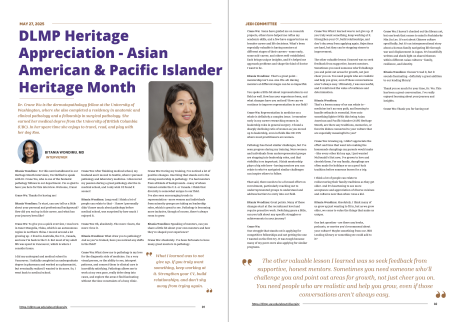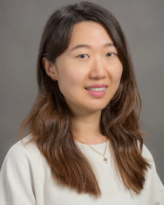DLMP Heritage Appreciation - Asian American & Pacific Islander Heritage Month
May 27, 2025

Interview by Bitania Wondimu, MD
Dr. Crane Wu is the dermatopathology fellow at the University of Washington, where she also completed a residency in anatomic and clinical pathology and a fellowship in surgical pathology. She earned her medical degree from the University of British Columbia (UBC). In her spare time she enjoys to travel, read, and play with her dog Roo.

Bitania Wondimu: For this next installment in our Heritage Month interviews, I’m thrilled to speak with Dr. Crane Wu, who is one of the fantastic pathology fellows in our department. I’m so glad to have you here for this interview. Welcome, Crane!
Crane Wu: Thanks for having me!
Bitania Wondimu: To start, can you tell us a little about your personal and professional background? How did you end up in this career, and what has your journey been like?
Crane Wu: To give you a quick overview, I was born in Inner Mongolia, China, which is an autonomous region in northern China. I moved around a lot growing up—I lived in Australia, the U.S., Canada, and now I’m back in the U.S. But most of my adult life was spent in Vancouver, which is where I consider home.
I did my undergrad and medical school in Vancouver. I initially completed an undergraduate degree in pharmacy and worked as a pharmacist, but eventually realized I wanted to do more. So, I went back to medical school.
After finishing medical school, my husband and I moved to Seattle, where I pursued pathology and laboratory medicine. I discovered my passion during a great pathology elective in medical school, and I only wish I’d found it sooner!
Bitania Wondimu: Long road! I think a lot of people can relate to that-- I know I personally didn’t know much about pathology before medical school, was surprised by how much I enjoyed it.
Crane Wu: Oh, absolutely. The more I learn, the more I love it.
Bitania Wondimu: What drew you to pathology? And as you’ve trained, have you noticed any shifts in the field?
Crane Wu: What drew me to pathology is my love for the diagnostic side of medicine. I’m a very visual person, so the ability to see, interpret patterns, and connect them to clinical care is incredibly satisfying. Pathology allows me to work at my own pace, really delve deep into cases, and explore the areas I find fascinating without the time constraints of a busy clinic.
During my training, I’ve noticed a lot of positive changes. One thing that stands out is the strong mentorship in pathology. I’ve had mentors from all kinds of backgrounds—many of whom trained outside the U.S. or Canada. I think that diversity is somewhat unique to our field. I’ve also seen encouraging trends in representation—more women and individuals from minority groups are taking on leadership roles, which is great to see. Pathology is becoming more inclusive, though of course, there’s always room to grow.
Bitania Wondimu: Speaking of mentors, can you share a little bit about your own mentors and how they’ve shaped your experience?
Crane Wu: Absolutely. I’ve been fortunate to have many great mentors in pathology. Some have guided me on research projects, others have helped me refine my academic skills, and a few have supported me on broader career and life decisions. What’s been especially valuable is having mentors at different stages of their careers—some early, some mid-career, and others well-established. Each brings unique insights, and it’s helped me approach problems and shape the kind of doctor I want to be.

Bitania Wondimu: That’s a great point—mentorship isn’t one-size-fits-all. Having mentors at different stages can be so impactful.
You spoke a little bit about representation in our field as well. How has your experience been, and what changes have you noticed? How can we continue to improve representation in our field?
Crane Wu: Representation in medicine as a whole is definitely a complex issue. I remember early in my career researching women in leadership roles in general surgery. I found a sharply declining ratio of women as you moved up to leadership, even in fields like OB-GYN where most practitioners are women.
Pathology has faced similar challenges, but I’ve seen progress during my training. More women and individuals from underrepresented groups are stepping into leadership roles, and that visibility is so important. I think mentorship plays a big role here—having mentors you can relate to who’ve navigated similar challenges can inspire others to follow.
That said, there needs to be a focused effort on recruitment, particularly reaching out to underrepresented groups to understand and address barriers to entry into our field.
Bitania Wondimu: Great points. Many of these changes start at the recruitment level and require proactive work. Switching gears a little, can you talk about any specific struggles or achievements in your journey?
Crane Wu: One struggle that stands out is applying for competitive fellowships and not getting the one I wanted on the first try. It was tough because many of my peers were also applying for similar programs.
What I learned was to not give up. If you truly want something, keep working at it. Strengthen your CV, build relationships, and don’t shy away from applying again. Rejections are hard, but they can be stepping stones to improvement.
The other valuable lesson I learned was so seek feedback from supportive, honest mentors. Sometimes you need someone who’ll challenge you and point out areas for growth, not just cheer you on. You need people who are realistic and help you grow, even if those conversations aren’t always easy. Ultimately, I was successful, and it reinforced the value of resilience and determination.
Bitania Wondimu: That’s a lesson many of us can relate to—medicine isn’t an easy path, and learning to handle setbacks is essential. Now onto something lighter! With this being Asian American and Pacific Islander (AAPI) Heritage Month, are there any traditions, memories, or favorite dishes connected to your culture that are especially meaningful to you?
Crane Wu: Growing up, I didn’t appreciate the effort and time that went into making the homemade dumplings my parents would make—like every other kid my age, I just wanted McDonald’s! But now, I’ve grown to love and cherish them. For my family, dumplings are often made for holidays or as a good-luck tradition before someone leaves for a trip.
I think a lot of people can relate to rediscovering their family traditions as they get older. And it’s heartening to see more acceptance and appreciation of diverse cuisines and cultures now than when I was a kid.
Bitania Wondimu: Absolutely. I think many of us grew up just wanting to fit in, but as we grow older, we come to value the things that make us unique.
One last question—are there any books, podcasts, or movies you’d recommend about your culture? Maybe something from our JEDI Lending Library or something we could add to it?
Crane Wu: I haven’t checked out the library yet, but one book that comes to mind is Pachinko by Min Jin Lee. It’s not about Chinese culture specifically, but it’s an intergenerational story about a Korean family navigating life through war and displacement in Japan. It’s beautifully written and sheds light on shared themes within different Asian cultures—family, resilience, and identity.
Bitania Wondimu: I haven’t read it, but it sounds fascinating—definitely a great addition to our lending library!
Thank you so much for your time, Dr. Wu. This has been a great conversation. I’ve really enjoyed learning about your journey and insights.
Crane Wu: Thank you for having me!
